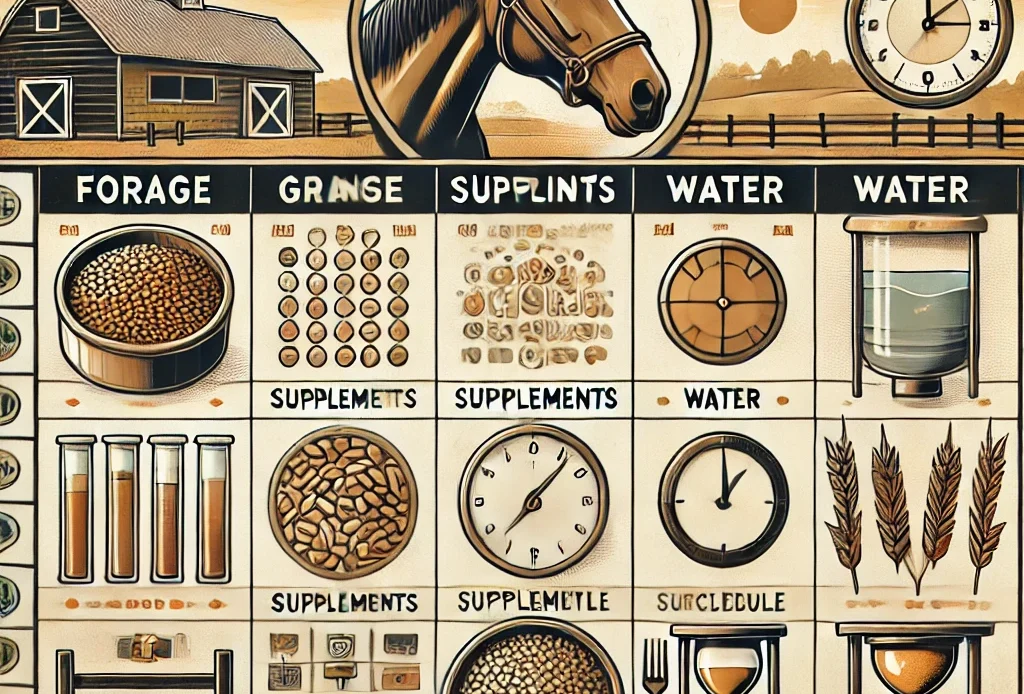When it comes to crafting a thorough horse feeding chart, understanding its essential elements is vital. You’ll need to take into account daily caloric needs to tailor the diet to your horse’s workload. Forage quality is fundamental, while concentrates can provide necessary energy boosts. Don’t overlook vitamins and minerals that play a significant role in overall health. Monitoring water intake and adjusting feed according to activity levels guarantees balance. Curious about recognizing special dietary requirements?
Determining Your Horse’s Daily Caloric Needs
When determining your horse’s daily caloric needs, you’ll want to take into account several key factors that influence their energy requirements.
Start by evaluating your horse’s body weight, activity level, and metabolic rate. For an accurate caloric calculation, consider the horse’s age, breed, and workload. A sedentary horse requires fewer calories compared to one in intense training.
Calculate energy expenditure by analyzing the horse’s basal metabolic rate (BMR) and additional energy needs due to exercise. Evidence-based guidelines suggest using the formula:
Daily Caloric Needs = BMR + Workload Energy.
Monitoring these metrics guarantees a balanced diet that supports peak health.
Understanding Forage as the Foundation
Accurately evaluating your horse’s daily caloric needs lays the groundwork for understanding the role of forage as the primary component of their diet. High-quality forage should make up most of the horse’s intake, providing essential fiber and nutrients.
Assess forage quality by examining nutrient content, maturity stage, and leaf-to-stem ratio. Different forage types, such as grass hay, legume hay, and pasture, offer varying nutritional profiles. Grass hay, like timothy, is lower in protein and energy, while legume hay, such as alfalfa, is higher in both.
Regularly test forage to verify it meets your horse’s dietary requirements, maximizing health and performance.
Incorporating Concentrates for Extra Energy
To optimize your horse’s energy levels, consider incorporating concentrates into their diet, particularly when forage alone doesn’t meet their caloric needs.
Concentrates provide efficient energy sources, essential for performance horses or those with higher activity demands. Start by selecting appropriate concentrate types, like grains, commercial mixes, or pelleted feeds, tailored to your horse’s specific requirements.
Scientific evidence shows that oats, corn, and barley are effective energy sources, offering varying levels of digestible energy.
Prioritize gradual introduction and monitoring to prevent digestive issues. Adjust the concentrate portion based on workload, ensuring it complements the forage without overshadowing its nutritional benefits.
Importance of Vitamins and Minerals
Although often overlooked, vitamins and minerals play an essential role in maintaining your horse’s overall health and performance. You must guarantee a proper balance of these nutrients to support immune function, bone development, and muscle contraction.
Vitamin sources include fresh forage and fortified feeds, providing necessary components like vitamin A for vision and vitamin E for muscle function.
Mineral balance is critical too; calcium and phosphorus are fundamental for strong bones, while electrolytes like sodium and potassium regulate nerve and muscle activity.
Deficiencies or imbalances can lead to serious health issues, so consistent monitoring and adjustments are indispensable.
Monitoring Water Intake
While often underestimated, monitoring your horse’s water intake is vital for maintaining ideal health and performance. Horses need consistent access to clean water sources to meet their hydration levels.
On average, a horse drinks 5 to 10 gallons daily, but factors like temperature, humidity, and diet can increase this need. Use automatic waterers or buckets to track consumption accurately.
Dehydration can impair digestion, circulation, and thermoregulation, leading to colic or other health issues. Regularly inspect water sources for cleanliness and proper function.
Adjust based on seasonal changes and individual needs to guarantee your horse remains hydrated and healthy year-round.
Adjusting Feed for Activity Level
Understanding your horse’s activity level is essential when adjusting its feed to guarantee ideal health and performance. A horse in high-intensity training requires more energy-dense feed than one at rest.
Begin by categorizing your horse’s activity level: light, moderate, or intense. Light work includes occasional riding, while moderate involves regular exercise, and intense covers competitive training. Use this categorization to guide feed adjustments, ensuring caloric intake aligns with energy expenditure.
Research supports increasing grain for active horses, but always balance with forage to maintain digestive health. Regularly reassess your horse’s condition and adjust feed accordingly, optimizing nutrition for its workload.
Recognizing Special Dietary Requirements
Identifying your horse’s unique dietary needs is essential for its health and performance. Horses with specific health conditions, like insulin resistance, require special diets.
For instance, a low-starch diet is important for managing laminitis. Consider high-fiber, low-sugar feeds if your horse is prone to metabolic disorders.
Pay attention to signs of allergies or intolerances, such as skin reactions or digestive upset, and adjust the diet accordingly.
Senior horses might need easily digestible feeds to maintain weight and energy.
Collaborate with your veterinarian to tailor a diet that addresses these special dietary requirements, ensuring your horse thrives in every aspect.
Conclusion
Feeding your horse is like tuning a finely crafted instrument; each element must harmonize for best performance. By understanding your horse’s daily caloric needs, selecting quality forage, and incorporating the right concentrates, you’re setting a strong nutritional foundation. Don’t overlook vitamins, minerals, and water intake—these are the keys to health. Adjust for activity levels and recognize special dietary needs. With careful attention to these elements, you guarantee your horse is poised for peak health and vigor.

